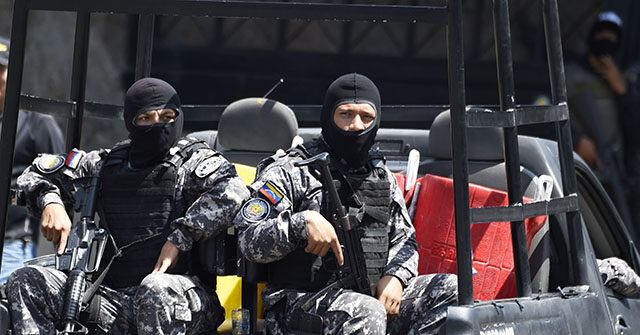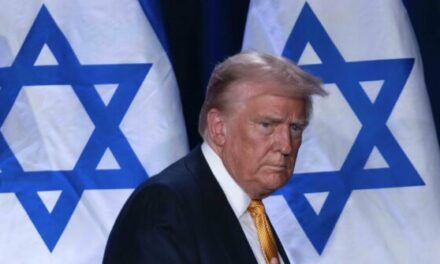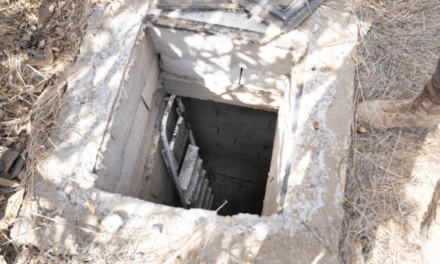We support our Publishers and Content Creators. You can view this story on their website by CLICKING HERE.

A joint Venezuelan journalistic investigation published on Monday across several local outlets revealed how socialist regime officials used social media to publicly hunt dissidents and brand them “enemies” and “terrorists” in the wake of the fraudulent July 28 presidential election.
The investigative report was prepared by the Venezuelan outlet Crónica Uno alongside the local non-government organizations Monitor Civil, Cazadores de Fake News (“Fake News Hunters,”), and the Latin American Center for Investigative Journalism (CLIP).
The investigation found that regime officials and others affiliated with the government used the Telegram and WhatsApp messaging applications, alongside other social media outlets, to publicly expose the identities and personal details of several individuals targeted by “Operation Knock Knock,” a persecution campaign the Venezuelan regime used to arrest dissidents, then force them to record humiliating “apology” videos edited together with imagery and music taken from famous Hollywood terror movies.
The Venezuelan socialist regime “relaunched” Operation Knock Knock alongside other brutal persecution tactics to crack down on dissidents that took the streets of the country following the fraudulent July 28 sham presidential election. Venezuelan electoral and other authorities — all loyal to dictator Nicolás Maduro — proclaimed him the “winner” of the sham election, granting him a new six-year term slated to begin on January 10, 2025. The regime offered no evidence, such as a record of votes, that Maduro won the election, while opposition leaders published local ballot tallies that showed Maduro suffering a crushing defeat.
Monday’s joint report detailed that the investigation documented 12 cases of individuals persecuted by the Maduro regime on social media and messaging platforms. The individuals, described as either activists or protesters, had their personal data published on social media profiles linked to the Venezuelan government shortly after the start of the protests. They were all imprisoned in detention centers.
One of the cases listed is of a man identified as “Raúl,” who claimed that he participated as a citizen observer of the electoral results at his local polling station.
“Raúl” asserted to the journalists that he did not participate in any protest, but denounced being the victim of a digital harassment campaign linked to members of the Venezuelan regime. He claimed Maduro officials imprisoned him for an unspecified amount of time shortly after his name, ID number, and photographs were published in social media with a “wanted” sign alongside other men and women.
According to “Raúl’s” testimony, the “wanted” sign identified him as a “guarimbero leader.” Guarimbero is a local slang term widely used by the Venezuelan regime over the past two decades to describe anti-regime protesters.
“I went into a very strong paranoia, to the point that I had to throw away my phone. I had the feeling that someone was listening to my calls,” the man told the journalistic team.
“Raúl” stated that an image with his personal information was shared by members of the ruling United Socialist Party of Venezuela (PSUV) in a local community WhatsApp group and on an anonymous Instagram account where he was labeled as a “terrorist.”
“Like Raúl, dozens of young people, political leaders, social and community leaders, or civilians who fulfilled their role as electoral observers or went out to protest, have been publicly exposed in social networks,” the report read. In addition to the 12 documented cases, the report confirmed those of another 16 citizens who remain imprisoned and two now in exile.
The report stated that the public persecution campaign was not a “spontaneous initiative” by regime supporters but that it involved interaction among state actors and collective efforts to reveal the targets’ information.
Marino Alvarado, coordinator of the Venezuelan non-government human rights organization Provea, stressed to the journalists that this is a “policy of state terrorism” where any person presumed to be a suspect “is at the mercy of the whim and arbitrariness of any police body.”
Most of the public persecution campaign actions, the report stated, originated from Telegram messaging groups, making special mention of a group identified as CazaGuarimbas (“Guarimba Hunters”) that, according to the report, was one of the first groups of its kind created during the protests to “hunt” dissident voices.
The investigation found that, “within seconds,” the group’s first publication was forwarded to the Telegram group belonging to the Directorate of Strategic and Tactical Actions (DAET) of the regime’s Bolivarian National Police. Further forwarded messages suggested a “coordination” between both groups. Links to the “Guarimba Hunters” channel were also reportedly shared through “CC200,” an internal electoral smartphone application used by PSUV.
In addition to Telegram, the report found that more than 30 accounts on the Chinese TikTok platform shared dozens of videos revealing the personal details of targets of Operation Knock Knock. Some of the dehumanizing content spread to other platforms such as Facebook or Twitter — collectively totaling 101 accounts and nearly 400 posts that the report documented across all platforms.
Maduro personally announced in August that VenApp, a multi-purpose platform developed by the ruling socialists, would be “upgraded” with new features to allow its users to report dissidents so that the regime’s law enforcement officials can “go against them.”
Venezuelan social media users responded to Maduro’s announcement by reporting VenApp in both Google’s Play Store and Apple’s App Store. The application was eventually taken down from both smartphone platforms shortly afterwards.
The international communist has largely rejected Maduro’s claimed presidential election “victory,” particularly in light of the ruling socialists’ refusal to publish voter data that can corroborate the “results.” Venezuelan opposition data showed Maduro losing in a landslide to its candidate, Edmundo González, a 75-year-old diplomat now living in exile.
According to U.N. estimates, Maduro’s brutal crackdown of the post-election protests left 27 dead and more than 2,400 detained — including dozens of children who have been subject to torture and accused of “terrorism.”
Christian K. Caruzo is a Venezuelan writer and documents life under socialism. You can follow him on Twitter here.

 Conservative
Conservative  Search
Search Trending
Trending Current News
Current News 







